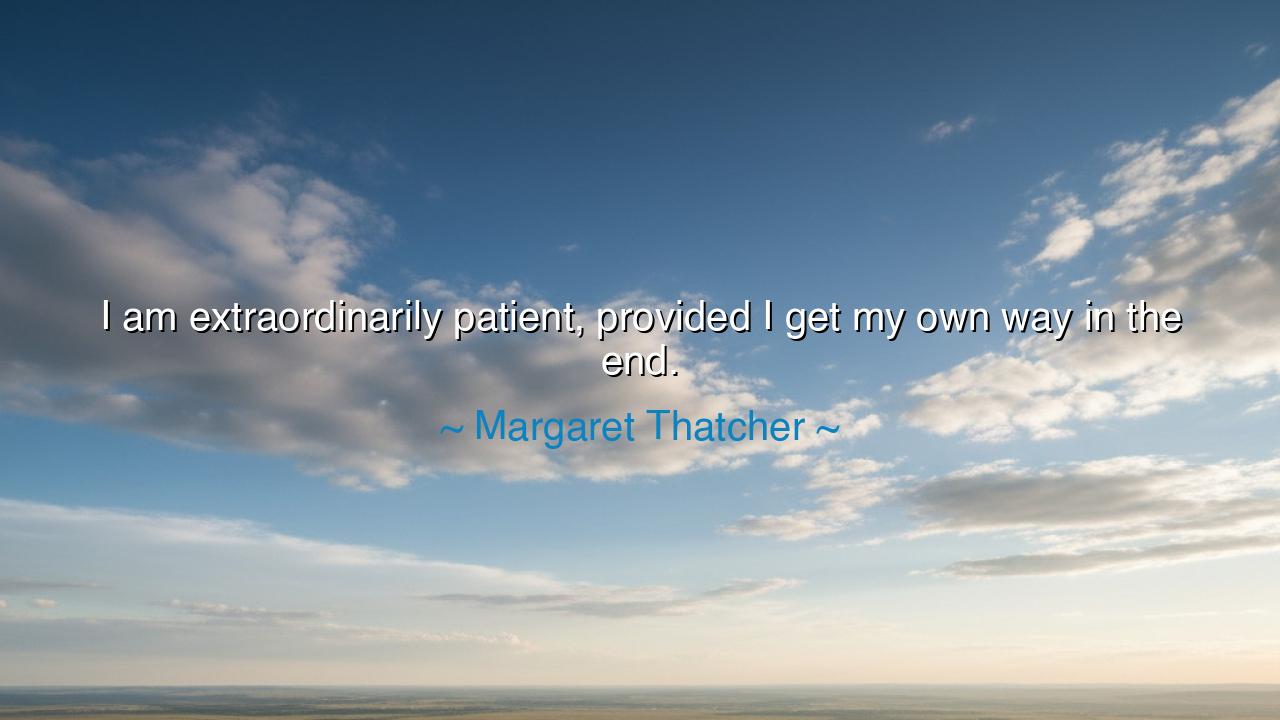
I am extraordinarily patient, provided I get my own way in the






The words of Margaret Thatcher — “I am extraordinarily patient, provided I get my own way in the end.” — reveal the iron beneath her composure, the unyielding will that earned her the title of the Iron Lady. In this declaration, Thatcher confesses that patience is not a passive waiting, but a strategic endurance, a weapon wielded by those who know the value of persistence. It is the patience of one who does not abandon her vision, but waits, maneuvers, and endures until victory is assured.
The meaning is sharp and resolute. Many imagine patience as surrender, as bowing before the flow of time. But Thatcher transforms it into a tool of conquest. Her way may not come swiftly, but she accepts delay as a temporary cloak, never as defeat. In politics, where storms rage and opposition rises like mountains, this kind of patience becomes not weakness but strength — the quiet fire that burns until obstacles crumble.
History gives us examples from Thatcher’s own life. When she faced fierce resistance to her economic reforms in Britain — privatization, deregulation, and battles with powerful unions — she did not bend to the outcry. She endured strikes, criticism, and even deep unpopularity, yet she clung to her course. Years later, when inflation dropped and industries reshaped, she was able to claim that her patience had indeed secured her way. Her political survival and dominance were forged not in surrender, but in relentless endurance.
This spirit can be seen across ages. Think of Abraham Lincoln, who endured years of scorn, failure, and ridicule before he rose to the presidency. His patience was not in abandoning his convictions but in waiting for the moment when the nation’s ear would be ready to hear him. His way — the preservation of the Union and the abolition of slavery — was realized through years of steadfast waiting and resolute action.
Let this wisdom be passed down: true patience is not passivity, but strategy. It is the courage to endure delay without surrendering the dream. Thatcher’s words remind us that the strongest souls are not those who demand immediate triumph, but those who endure the long struggle, knowing that persistence bends the world toward their way. For in the end, time bows not to the impatient, but to the steadfast.






TLThao Le
This quote makes me think about how patience is often seen as a virtue, but in this case, it's framed as a means to an end. Does this imply that people, especially leaders, should only be patient if they know they’ll ultimately get what they want? Can patience be genuinely selfless, or is it often about waiting for the right moment to seize control?
HNHan Nguyen
I find this quote both amusing and a bit unsettling. On the one hand, it’s a brilliant strategy for getting ahead, but it also suggests that patience is merely a tactic to reach a predetermined goal. Is this a healthy approach for leaders? Or does it risk alienating others by making patience seem like a calculated maneuver?
TLTran Le Thuy Linh
Thatcher's quote highlights an interesting tension between patience and control. Is it possible to practice patience while letting go of the outcome? Or, is this quote a more honest reflection of how power dynamics often work—especially in politics and leadership? How does this mindset affect the trust people place in their leaders?
HKhoc Khoa
I can’t help but wonder whether this approach to patience is actually a form of manipulation. If someone is patient just to ensure they get their own way in the end, does that make their patience more about control than virtue? Does this attitude undermine the essence of true patience in leadership and relationships?
HTTrung Hieu Tran
Margaret Thatcher’s quote seems to reflect a kind of steely determination—being patient, but only with the expectation that things will turn out in her favor. How does this view of patience align with leadership? Can true patience exist without a clear understanding of the desired outcome, or is that merely strategic thinking in disguise?